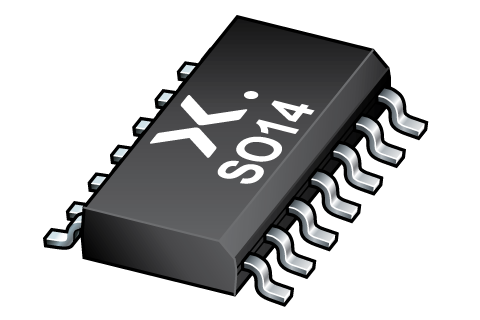Orderable parts
| Type number | Orderable part number | Ordering code (12NC) | Package | Buy from distributors |
|---|---|---|---|---|
| 74AHCT164D | 74AHCT164D,118 | 935265463118 | SOT108-1 | Order product |

Register once, drag and drop ECAD models into your CAD tool and speed up your design.
Click here for more information8-bit serial-in/parallel-out shift register
The 74AHC164; 74AHCT164 is an 8-bit serial-in/parallel-out shift register. The device features two serial data inputs (DSA and DSB), eight parallel data outputs (Q0 to Q7). Data is entered serially through DSA or DSB and either input can be used as an active HIGH enable for data entry through the other input. Data is shifted on the LOW-to-HIGH transitions of the clock (CP) input. A LOW on the master reset input (MR) clears the register and forces all outputs LOW, independently of other inputs. Inputs are overvoltage tolerant. This feature allows the use of these devices as translators in mixed voltage environments.
Wide supply voltage range from 2.0 V to 5.5 V
Overvoltage tolerant inputs to 5.5 V
High noise immunity
CMOS low power dissipation
Balanced propagation delays
All inputs have Schmitt-trigger actions
Input levels:
For 74AHC164: CMOS level
For 74AHCT164: TTL level
Latch-up performance exceeds 100 mA per JESD 78 Class II Level A
ESD protection:
HBM: ANSI/ESDA/JEDEC JS-001 class 2 exceeds 2000 V
CDM: ANSI/ESDA/JEDEC JS-002 class C3 exceeds 1000 V
Multiple package options
Specified from -40 °C to +85 °C and from -40 °C to +125 °C
| Type number | VCC (V) | Logic switching levels | Output drive capability (mA) | tpd (ns) | fmax (MHz) | Nr of bits | Power dissipation considerations | Tamb (°C) | Rth(j-a) (K/W) | Ψth(j-top) (K/W) | Rth(j-c) (K/W) | Package name |
|---|---|---|---|---|---|---|---|---|---|---|---|---|
| 74AHCT164D | 4.5 - 5.5 | TTL | ± 8 | 3.4 | 115 | 8 | low | -40~125 | 104 | 17.6 | 62 | SO14 |
| Model Name | Description |
|---|---|
|
|
| Type number | Orderable part number, (Ordering code (12NC)) | Status | Marking | Package | Package information | Reflow-/Wave soldering | Packing |
|---|---|---|---|---|---|---|---|
| 74AHCT164D | 74AHCT164D,118 (935265463118) |
Active | 74AHCT164D |

SO14 (SOT108-1) |
SOT108-1 |
SO-SOJ-REFLOW
SO-SOJ-WAVE WAVE_BG-BD-1 |
SOT108-1_118 |
| Type number | Orderable part number | Chemical content | RoHS | RHF-indicator |
|---|---|---|---|---|
| 74AHCT164D | 74AHCT164D,118 | 74AHCT164D |
|
|
| File name | Title | Type | Date |
|---|---|---|---|
| 74AHC_AHCT164 | 8-bit serial-in/parallel-out shift register | Data sheet | 2024-03-07 |
| AN11106 | Pin FMEA for AHC/AHCT family | Application note | 2019-01-09 |
| AN90063 | Questions about package outline drawings | Application note | 2025-10-22 |
| SOT108-1 | 3D model for products with SOT108-1 package | Design support | 2020-01-22 |
| ahct164 | ahct164 IBIS model | IBIS model | 2013-04-08 |
| Nexperia_package_poster | Nexperia package poster | Leaflet | 2020-05-15 |
| SO14_SOT108-1_mk | plastic, small outline package; 14 leads; 1.27 mm pitch; 8.65 mm x 3.9 mm x 1.75 mm body | Marcom graphics | 2017-01-28 |
| SOT108-1 | plastic, small outline package; 14 leads; 1.27 mm pitch; 8.65 mm x 3.9 mm x 1.75 mm body | Package information | 2023-11-07 |
| SOT108-1_118 | SO14; Reel pack for SMD, 13"; Q1/T1 product orientation | Packing information | 2024-02-19 |
| 74AHCT164D_Nexperia_Product_Reliability | 74AHCT164D Nexperia Product Reliability | Quality document | 2025-03-20 |
| SO-SOJ-REFLOW | Footprint for reflow soldering | Reflow soldering | 2009-10-08 |
| SO-SOJ-WAVE | Footprint for wave soldering | Wave soldering | 2009-10-08 |
| WAVE_BG-BD-1 | Wave soldering profile | Wave soldering | 2021-09-08 |
If you are in need of design/technical support, let us know and fill in the answer form we'll get back to you shortly.
The Nexperia Longevity Program is aimed to provide our customers information from time to time about the expected time that our products can be ordered. The NLP is reviewed and updated regularly by our Executive Management Team. View our longevity program here.
| Model Name | Description |
|---|---|
|
|
| Type number | Orderable part number | Ordering code (12NC) | Status | Packing | Packing Quantity | Buy online |
|---|---|---|---|---|---|---|
| 74AHCT164D | 74AHCT164D,118 | 935265463118 | Active | SOT108-1_118 | 2,500 |
|
As a Nexperia customer you can order samples via our sales organization.
If you do not have a direct account with Nexperia our network of global and regional distributors is available and equipped to support you with Nexperia samples. Check out the list of official distributors.
The interactive datasheets are based on the Nexperia MOSFET precision electrothermal models. With our interactive datasheets you can simply specify your own conditions interactively. Start by changing the values of the conditions. You can do this by using the sliders in the condition fields. By dragging the sliders you will see how the MOSFET will perform at the new conditions set.